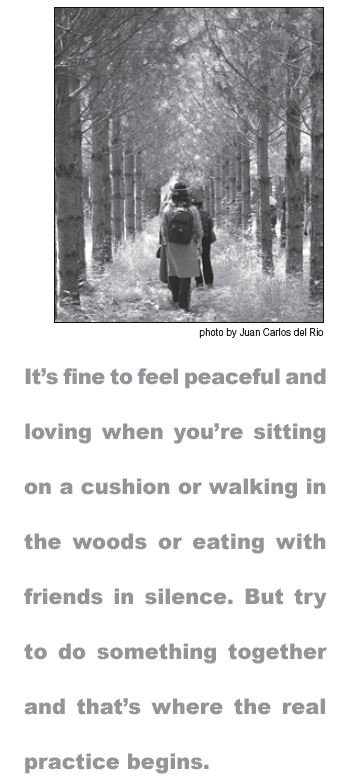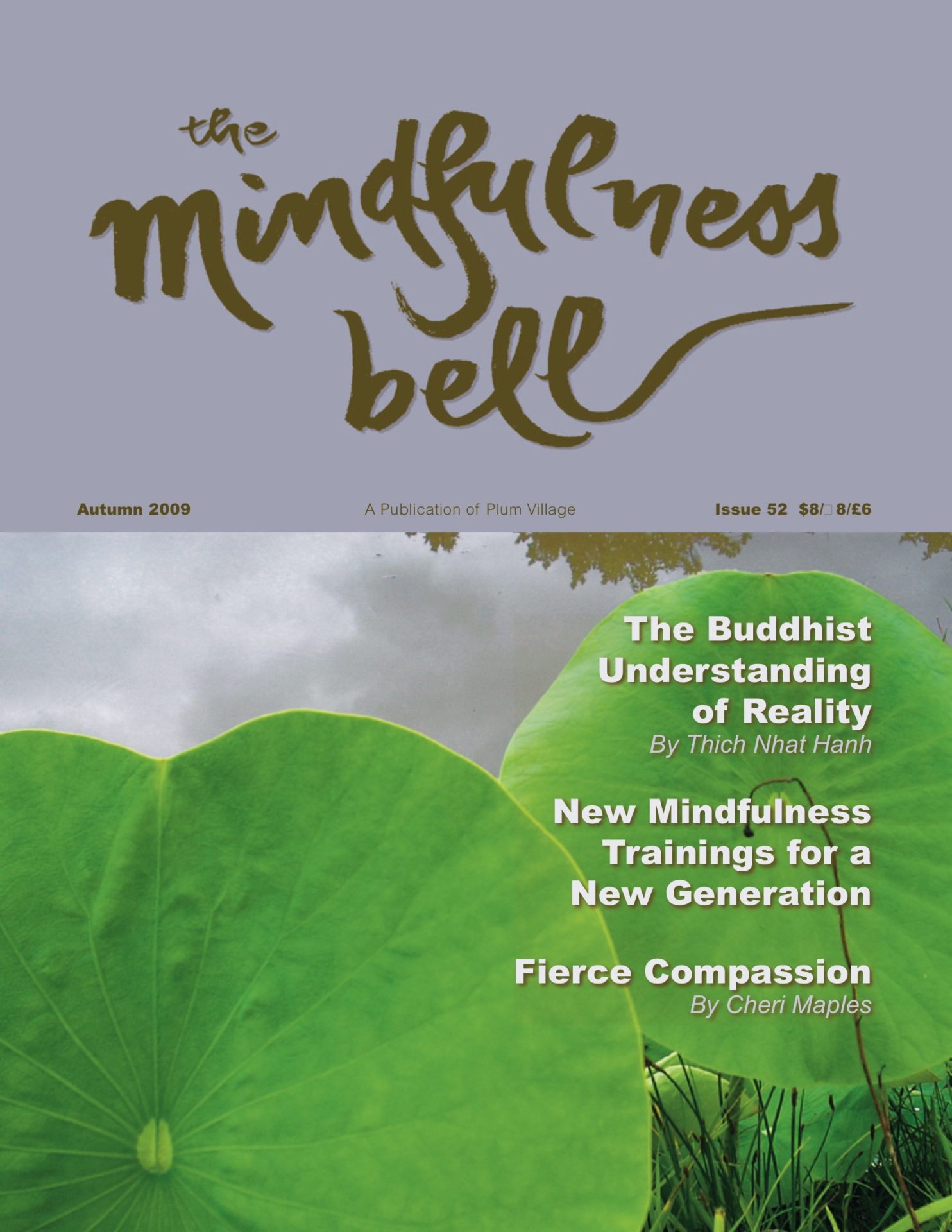By Jane Ellen Combelic in October 2009

A Buddhist retreat at Plum Village is unlike any other Buddhist retreat (as far as I know). There’s relatively little sitting meditation, which surprises and disappoints some folks. But there are lots of other forms of meditation — in fact the practice of mindfulness means meditating twenty-four hours a day, no matter what we are doing. The point, of course,
By Jane Ellen Combelic in October 2009

A Buddhist retreat at Plum Village is unlike any other Buddhist retreat (as far as I know). There’s relatively little sitting meditation, which surprises and disappoints some folks. But there are lots of other forms of meditation — in fact the practice of mindfulness means meditating twenty-four hours a day, no matter what we are doing. The point, of course, is to teach us how to do this in daily life, out in the “real” world.
There are two particularly ingenious methods that Plum Village has devised for teaching the practice of mindfulness. The first is working meditation. At the Path of the Buddha retreat, I was in the francophone family with my friend Pascale and my mentor, Sister Dao Nghiem. Our job for the three-week retreat was to clean the bathrooms in Lower Hamlet. Hence our name: Delicate Fragrance.
Working with people every day, you get to know who likes to scrub every corner and who would rather pick flowers for the sinks. Who has a bad back but doesn’t want to complain. Who stops to chat (and chat and chat), who’s cheerful no matter what, who’s grumpy. Who wants to tell people exactly how to do everything (me) and who on the second day realizes that grown women know how to clean bathrooms and can decide among themselves who’s going to do what (me again).
You learn a lot about other people, but mainly you learn about yourself, in the context of community and activity. Being as how most of us live and work with others, these lessons come in very handy once we return home.
On the Road to Plum Village
The other ingenious device to teach mindfulness on retreat is the skit. Most Vietnamese people love to play; and since their culture was only recently infected with modern technology, they still enjoy old-fashioned homegrown entertainment. So at the end of every retreat there’s a grand performance. Fortunately, we’re doing the performances within each hamlet rather than all 600 of us together. After living together for three weeks, Lower Hamlet feels like one big family.
Which is a good thing, because there’s nothing that brings up people’s neuroses like the idea of performing in public.
Unlike most families, we started working on our skit the very first week. Serge, the one man among twenty-three women (our hamlet hosts women and a few couples), proposed a lovely old French folk song that someone had rewritten into a Plum Village song, “On the Road to Plum Village.” We decided to rewrite the song again with a story about us: arriving at Plum Village all tired and stressed out, then cleaning toilets and showers together, finally finding freedom and happiness.
Working on the song that first week was a blast. A few people did the writing, then Beatrice, a delightful and energetic Swiss woman who could not for the life of her hold a tune, emerged as the director. We formed two choirs who sang back and forth to each other. Sur la route des Pruniers...
At the end of the second week it all turned sour. We’d been rehearsing every day, and had the music down pretty well but were getting tired of it. Hélène, who happens to be a fabulous singer, arrived at the retreat two weeks late. That evening she sat down with the only two people who still wanted to rehearse and she taught them a slightly different version of the tune. And the three of them came up with a new way of performing it.
The next evening after dinner we started to rehearse, and all hell broke loose. Ah non non non! On recommence pas à zéro! No, we’re not starting over, someone huffed and stomped off. Others shook their heads in disgust and did not return from cleaning their dishes. The rest of us regrouped, decided to put the song mostly back the way we had it, and had a great time singing our hearts out and laughing.
The next day we started adding the skit. It had been my bright idea to have actors pantomime what the words were saying. (No one in our audience was going to understand our song, because it was in French! The other 140 retreatants at Lower Hamlet were British, Dutch, German, American, with a few Italians.) From the supply closet by the kitchen, I had collected all kinds of props — new brushes, sponges, mops, spray bottles — all stashed in a suitcase for the first part of the skit.
Retreat Rockettes
Don’t you just wish that after all these years of listening to Dharma talks, meditating, paying therapists, going on retreat — don’t you wish you could stay enlightened for more than thirty seconds at a time? When it came time to create the little skit, just three minutes of pantomime, my ego came out to play. Big time.
Because I had some really good ideas! Brilliant ideas! Every morning and every evening in meditation, in the deep stillness of the meditation hall, it was the first thing that sprang into my mind: Sur la route des Pruniers... I saw our three nuns doing this, and our lay friends doing that in the next verse, and a stupendous finale with everybody dancing... as stunning as the Rockettes of Radio City Music Hall.
Enough already! Quiet.
When it came time to rehearse with our family, my overbearing enthusiasm was not well received. Beatrice was a little miffed that I had wrenched all the fun stuff away from her. And the actors never managed to come together at the same time: Andréa got sick, Géraldine had to make an emergency trip to care for a friend, Josslyn had somewhere else to be after Dharma discussion. But the obvious reason that it didn’t come together is that it was supposed to be a collaboration. Silly me.
Day after day, I dealt with my feelings and frustrations — looking deeply in meditation, stepping back when rehearsals weren’t going well, letting go, letting go.
Thank goodness the performance was pushed back to Thursday. On Tuesday Sister Dao Nghiem, who had left us to our own devices, initiated a rehearsal. The two groups sullenly stood facing each other in a semicircle and half-heartedly sang: Sur la route des Pruniers... The nuns walked through the center as we had scripted. The actors feebly acted out our part. With only a little squabbling in the middle, we limped to the finale.
Sister Dao Nghiem calmly admonished us to relax a little bit and have fun. Then she redesigned the ending, adding some peaceful walking in pairs rather than our manic scurrying and jumping. We performed it a few more times but our hearts weren’t in it.
I Have an Idea!
The big day came. We rehearsed before dinner, but it wasn’t going very well. I was disgusted with myself for getting so hung up on the whole thing, for not being able to communicate my ideas effectively, and especially because my magnificent finale had been scrapped.
Finally I decided to just throw myself into it. What did I have to lose? I banished my ego once and for all and joined in the fun. We were nervous, we were excited, we were enjoying ourselves again.
Then Hélène said, “Attendez, j’ai une idée! Wait, I have an idea!” We all screamed. She was joking of course. Béatrice suggested next time we do a skit we should call it “I have an idea!” We all laughed; we knew exactly what she meant.
That night in the meditation hall we were one of the last acts to perform. There were five or six before us, all funnier and more inspired than the last. The pot-washing family pounded tubs and pans for an energetic percussion piece, accompanied by nuns and laywomen waving big pot lids in a traditional Vietnamese hat dance. The vegetable-chopping family did a skit about having to work in silence (Delicate Fragrance conveniently forgot about the practice of silent working meditation).
When it came our turn, yes, you guessed it — we pulled it off! Our fellow retreatants laughed and clapped along to our silly song. We exited the stage area breathless, joyful, eminently pleased with ourselves.
Someone from another family later remarked on how much harmony there was in our family. We laughed our heads off when we heard that.
But there was harmony. A far deeper harmony than when we started. During the worst of it, when some people disappeared from the family for a day or two and our dinners together were glum, Sister Dao Nghiem told us that harmony does not mean the absence of conflict. You can have differences — in a community there will always be differences — but still you have harmony because you care about one another. You want it to work, so you do whatever it takes.
In fact, I believe those very difficulties are what knit the community into a harmonious whole. How else would we get to know one another deeply, to know ourselves?
That’s why Thay says he wouldn’t want to go to a heaven where there’s no suffering. It’s in those cracks that healing occurs. It’s when our heart breaks that we learn how to love.
That’s the whole point of the skit — aside from motivating us to relax and play, us Westerners who can take the whole thing so seriously. It’s fi to feel peaceful and loving when you’re sitting on a cushion or walking in the woods or eating with friends in silence. But try to do something together and that’s where the real practice begins.
Those are the lessons that I’ve taken home with me, and put to use in my daily life -- humility, joy, Sur la route des Pruniers...


